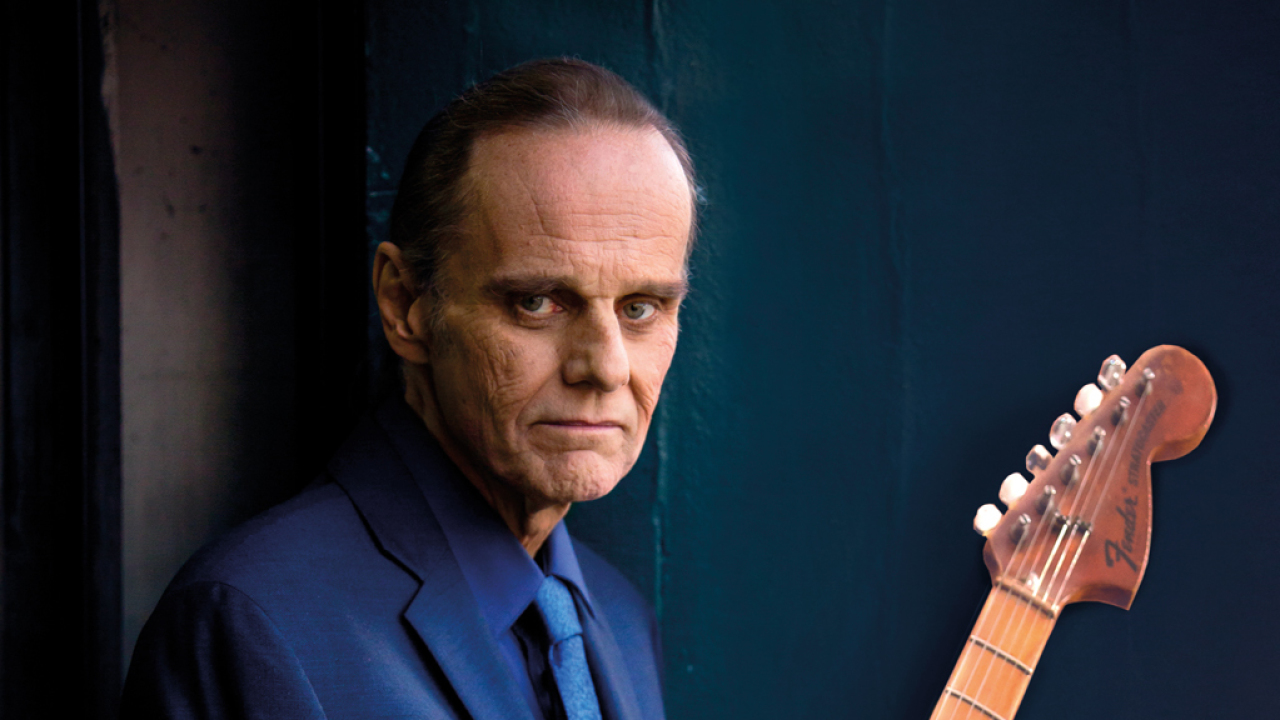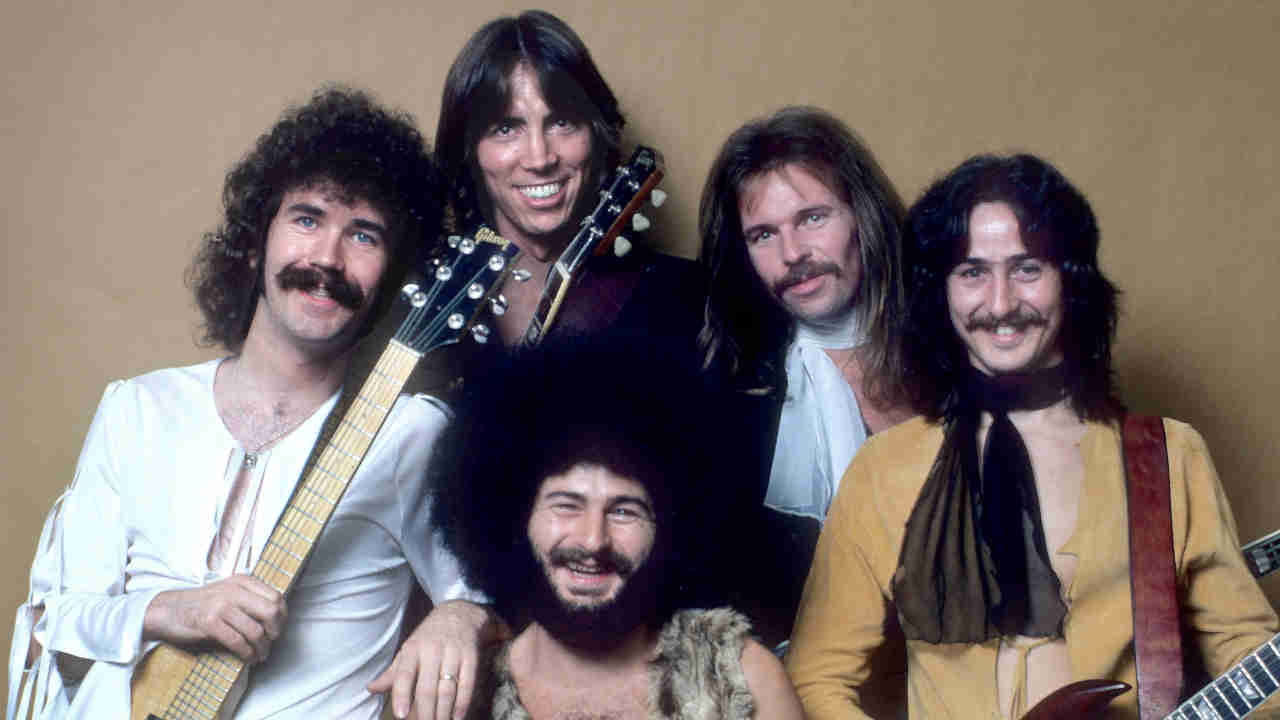Q&A: Walter Trout
He was mere days away from death, but thanks to a liver donor and fans, the bluesman now has a miraculous second chance.

Select the newsletters you’d like to receive. Then, add your email to sign up.
You are now subscribed
Your newsletter sign-up was successful
Want to add more newsletters?

Every Friday
Louder
Louder’s weekly newsletter is jam-packed with the team’s personal highlights from the last seven days, including features, breaking news, reviews and tons of juicy exclusives from the world of alternative music.

Every Friday
Classic Rock
The Classic Rock newsletter is an essential read for the discerning rock fan. Every week we bring you the news, reviews and the very best features and interviews from our extensive archive. Written by rock fans for rock fans.

Every Friday
Metal Hammer
For the last four decades Metal Hammer has been the world’s greatest metal magazine. Created by metalheads for metalheads, ‘Hammer takes you behind the scenes, closer to the action, and nearer to the bands that you love the most.

Every Friday
Prog
The Prog newsletter brings you the very best of Prog Magazine and our website, every Friday. We'll deliver you the very latest news from the Prog universe, informative features and archive material from Prog’s impressive vault.
Entering his 25th year as a solo artist, Walter Trout had big plans: a catalogue overhaul, an official biography of his life, a documentary film and a new studio record. However, he was hit with cirrhosis of the liver, these things might have happened posthumously.
How is the recovery going?
It’s been tough. Around a month ago I woke up to find I was bleeding out of my butt. Over the next 20 minutes I lost all of the blood in my body – they had to replace 13 pints – and I went into a coma for three days. After that I had this thing called an encephalopathy, which is temporary brain damage. I couldn’t speak English and didn’t know who I was or recognise anybody else. Basically I was a vegetable. And that condition lasted another six or seven days. I should’ve been dead at that point.
We came that close to losing you?
My doctors say it’s amazing I’m still here. But my kidneys are functioning again and the liver they gave me is pristine. My lungs and heart are fine. My problem is recovering from the surgery… I’ve been filleted like a fish – there’s a fish joke for you [chuckles].
Do you know the donor’s identity?
No, they don’t tell you. Down the line, you can write a letter to the family which the hospital passes on. But one of the doctors slipped and said it came from a teenager, so it’s a pristine liver.
Sign up below to get the latest from Classic Rock, plus exclusive special offers, direct to your inbox!
**The Classic Rock Awards were less than a year ago. It was shocking to see you so emaciated. Are the weight and mental agility returning? **
Yeah. And so is my sense of humour. But over seven months I lost a hundred pounds, most of which was muscle mass. So I’m taking the rest of 2014 off to work on rebuilding my strength. Right now I don’t have enough muscles in my forearm to bend a [guitar] string. I don’t know if I’ll ever get back to where I once was, but I hope to go out and play again.
**The title track of your new album ends with the pay-off line: ‘I’ll never be the same again.’ That must be tough to deal with. **
Yeah. I wrote that pre-transplant, but now I’m a different guy. I see beauty where I never saw it. I no longer take anything for granted, and I’m grateful to be here still.
The fans raised $245,000 for your treatment. Did you know you were so loved?
No. And I was a little overwhelmed to discover that I was… [starts quietly sobbing].
Sorry, I didn’t mean to upset you.
That’s okay, man. [After regaining composure] No, I had no idea. I was in shock. And it was them doing that that has enabled me to take a year off, so that when I do come back and play for those people that love me, I can give them my best. And if I can’t reach an acceptable standard, I won’t do it anymore. I won’t play half-assed.
_The song The Bottom Of The River includes the lines: ‘I made it to the surface, I was gasping for my breath/And I cried in realisation that I had cheated death.’ _
Well, it’s true. And it was a kind of therapy.
It is at times a painfully honest album. Wastin’ Away, for example, is about the self you saw in the bathroom mirror: ‘I weep when I realise that now I’m living day to day.’
Well, I’m literally skin and bones right now. Getting those thoughts down on paper enabled me to focus. Why was this all happening now? For many years I’ve been clean and sober, I kept myself in great shape, I’ve got a beautiful family. And there I was, looking down the barrel of a gun. It was hard to process those thoughts.
**At times you were so ill that you spent more time driving to and from the studio than actually working on the record… **
It’s true. I’d sing a song, maybe play a couple of solos, and feel so drained that I had to go home and back to bed.
You’ve been pragmatic about the limitations of your voice.
I just couldn’t get the power that I needed. I think it’ll come back with time. I certainly hope so. Meanwhile… it is what it is.
**Until then, you’ve given your blessing to your friend and prodigy Danny Bryant to go out on the road in the US with your backing band, playing songs from your new album. **
Yeah. Besides being one of my dearest friends, Danny is a great artist who’s starting to come into his own. So my band, who depend on a pay cheque, get to work, and I also help to get Danny’s career going. It’s a win-win situation.
Danny isn’t the first younger blues artist you’ve taken under your wing. You’ve also mentored Mitch Laddie, Laurence Jones and Oli Brown, among others. Is that because of how John Mayall nurtured and guided you?
Yeah. It’s very important for me to encourage the next generation because I want to see this music go on. My grandchildren shouldn’t have to endure computer music played by robots when they can have art from humans, expressing their feelings about the world and their lives. It’s imperative that Danny, Laurence and those kids carry it on, and anything I can do to help them I will.
In your book, you relate the story of a crucial encounter with jazz legend Duke Ellington on your tenth birthday. Your mum had the bravado to get you backstage, where the Duke gave you a pep talk that changed your life.
I still remember it vividly. I had never met anyone with such charisma. He sat me down and told me all about the music business, especially how not to get sidetracked by seeking fame or money. That advice was priceless.
**The book is an entertaining read, from you playing with John Lee Hooker and Canned Heat to darker days such as being forced to sleep in a dog kennel as an impoverished muso. **
My kids all aspire to be musicians, and I wanted to tell them that there’s a whole other side of things besides the so-called glamour. The business is full of thieves and crooks, and they will suffer along the way. I wanted to relate both sides of the story.
Two anecdotes stand out. In the first you’re dressed in a gorilla suit, with no underwear, off your head on LSD and lost in Los Angeles on your very first day in the city, in 1974.
I’d been to a Halloween party, left the place and got lost. I ended up in a café sobbing to the waitress about being penniless and ready to jump off a building. Years later I was playing a gig and this girl kept staring at me. It was the waitress: “You were the gorilla guy!”
In the second you’re freebasing cocaine through a glass pipe, using your own soiled underpants as a filter.
**I knew at that point I had hit rock bottom. That was such a disgusting thing to do.
You’re renowned for an easy-going nature, but the book tells how, following an altercation many years earlier, you once charged Albert King £150 for an emergency loan of an amplifier. That could be seen as mean-spirited.**
Well, in refusing to let me use the backstage toilet – “It’s for the headliner only!” – he was mean-spirited to me. That same night, Jimmy Trapp, my bass player, had said: “Hey, Mr King, you’ve got a great band.” And Albert replied: “Who the fuck are you?” Albert King is one of the most mean-spirited people I’ve ever met. And what goes around comes around. You give me respect, you’ll get it back.
For similar reasons, you won’t allow the drummers you’ve had in your band to play jazz drummer Buddy Rich on the tour bus.
No. I don’t want to hear him. The guy physically attacked me, almost tried to kill me, for the crime of asking for an autograph for my dad. I was in a music store at the age of 15, and when I requested the signature – with all politeness – he knocked me on the floor and started hitting me, yelling: “You fucking little asshole.” I don’t care how good he plays, this is about humanity.
**Has your illness changed your outlook? If Buddy apologised to you now, would you accept it? **
Of course. If someone looks in the mirror and says: “God, I fucked up. I’m an idiot,” how could I not? I’d be the first to put my arms around him and say: “Buddy, there’s no problem whatsoever.”
**What about acceptance of your own blame? You got sober on July 9, 1987, but only after more than a decade of excess. The damage done to your liver was your own fault, right? **
Oh, absolutely. I did this to myself. Recently I spoke at my kid’s high-school music class, which was full of young guitar players. I told them: “As great musicians, you will be presented with choices that will dictate what happens in your lives. Look at me now. I’m a hundred pounds lighter than I should be and it’s due to mistakes made in my youth.” At that age, everyone believes they’re immortal. The lesson is that our choices are important. We should think closely about them before going off on some self-destructive spree.
The Blues Came Callin’ is out now via Provogue Records. Rescued From Reality, Trout’s official biography, is out now via MLG Publishing.

Dave Ling was a co-founder of Classic Rock magazine. His words have appeared in a variety of music publications, including RAW, Kerrang!, Metal Hammer, Prog, Rock Candy, Fireworks and Sounds. Dave’s life was shaped in 1974 through the purchase of a copy of Sweet’s album ‘Sweet Fanny Adams’, along with early gig experiences from Status Quo, Rush, Iron Maiden, AC/DC, Yes and Queen. As a lifelong season ticket holder of Crystal Palace FC, he is completely incapable of uttering the word ‘Br***ton’.
